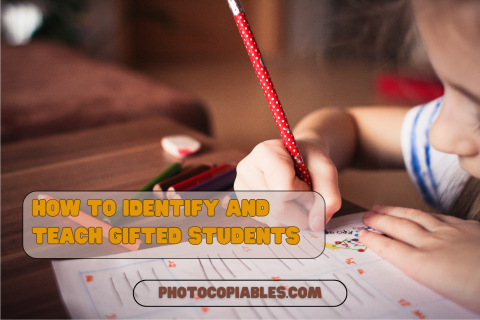Gifted students are those who demonstrate exceptional abilities in one or more domains, such as academics, creativity, leadership, or the arts. They have a fast and deep learning capacity, a high level of curiosity and originality, and a strong motivation to excel. However, gifted students may also face some difficulties, such as boredom, frustration, and social isolation.
In addition to the common traits mentioned above, some gifted students have a strong sense of justice. Let’s dive into this interesting feature of gifted children.
The Exceptional Sense of Justice Among Gifted Students

Some gifted students possess a remarkable sense of justice that sets them apart from their peers. This heightened fairness can be attributed to their exceptional intellectual ability, deep empathy, and boundless creativity. They may be able to empathize with others who are suffering or oppressed and feel a moral obligation to help them. They may also be able to critically analyze the social and political issues that affect their lives and the lives of others. They may be passionate about human rights, environmental protection, or social justice causes. Research suggests that gifted students often have a strong sense of justice, which can be attributed to various factors:
- Intellectual ability: Gifted students are more likely to be able to understand complex social issues and think critically about them. According to Silverman and Keirsey (1984), gifted students exhibit higher levels of abstract thinking, problem-solving ability, and intellectual curiosity. This intellectual ability allows them to analyze social problems from different perspectives and develop fair and equitable solutions. For example, a gifted student may be able to understand the complex relationship between poverty and crime. They may be able to see that poverty can lead to crime and that crime can lead to poverty. They may also be able to understand the role of social institutions, such as schools and the criminal justice system, in perpetuating these problems. Another example would be a gifted student who may be able to come up with a solution to the problem of poverty that does not simply involve throwing money at the problem. They may be able to come up with a solution that addresses the root causes of poverty, such as lack of education, lack of job opportunities, and lack of access to healthcare.
- Empathy: Gifted students are more likely to be able to empathize with others and understand their experiences. Dabrowski and Piechowski (1977) found that gifted individuals tend to exhibit higher levels of emotional sensitivity and empathy. This empathy can motivate them to help others and work towards social justice.
- Creativity: Gifted students are more likely to be creative and think outside the box. Runco (2007) found that gifted individuals tend to exhibit higher levels of creativity and originality. This creativity can allow them to come up with innovative solutions to social problems and see the potential in others.
Gifted students with a strong sense of justice can use their intellectual ability, empathy, and creativity to make a real difference in the world. They can work towards creating a more just and equitable society by developing new ideas and solutions to social problems.
Boredom, Frustration, and Social Isolation: Three Common Challenges for Gifted Students
Gifted students may face challenges such as boredom, frustration, and social isolation in their schools.
Boredom
 Gifted students may be bored with the regular curriculum and need more challenging work. Renzulli (1978) found that gifted students who were not challenged in school were more likely to be bored, frustrated, and disruptive. Gifted students who are bored in school may lose interest and motivation in their classes.
Gifted students may be bored with the regular curriculum and need more challenging work. Renzulli (1978) found that gifted students who were not challenged in school were more likely to be bored, frustrated, and disruptive. Gifted students who are bored in school may lose interest and motivation in their classes.
Frustration
Gifted students may become frustrated when they are not challenged or when they are not allowed to express their creativity. Silverman (1984) found that gifted students who were not challenged were more likely to have low self-esteem, depression, and anxiety.
Social isolation
Gifted students may feel isolated from their peers because they are different. Gifted students who feel isolated may feel alone and unloved. Besides, Baum (2002) found that gifted students were more likely to be bullied than their non-gifted peers.
It is important for parents and teachers to be aware of the challenges that gifted students may face. By providing gifted students with challenging work, opportunities for creativity, and support, we can help them to overcome these difficulties and reach their full potential.
In addition to the challenges faced by gifted students, some may struggle with underachievement in school. This could be because they want to be liked by their peers and worry that studying too much may make them appear uncool and look like a geek. As a result, they may underperform to fit in with their social group.
A study by Neihart, Reis, Robinson, and Moon (2002) found that gifted students who did not have peer relationships were more likely to experience social and emotional difficulties, which could lead to underachievement. Additionally, a study by Chen and Chen (2010) found that gifted students who valued peer relationships were more likely to engage in academic self-handicapping, which can contribute to underachievement. However, it is important to note that not all gifted students will experience underachievement, and other factors, such as lack of challenge or low expectations from teachers, can also contribute to this issue.
Last but not least, perfectionism can lead to behaviour issues as gifted students can become overly self-critical and may struggle to accept anything less than perfection, which is supported by both Colangelo and Davis (2003) and Gallagher (2012). This can result in negative consequences, such as anxiety, stress, and difficulty accepting mistakes or criticism. This is a widely recognized issue in the field of gifted education.
How to Teach Gifted Students
Once you have identified gifted students in your classroom, there are a number of things you can do to help them succeed in school and beyond.
- Provide challenging work: Gifted students need to be challenged in order to stay engaged. This doesn’t mean that you should give them work that is too difficult, but it should be challenging enough to stretch their abilities. You can use strategies such as differentiation, acceleration, enrichment, or compacting to provide challenging work for gifted students.
- Encourage creativity and critical thinking: Gifted students are often creative thinkers, so encourage them to explore their ideas and express their opinions. Help them to develop their critical thinking skills so that they can make informed decisions and evaluate arguments. You can use strategies such as brainstorming, problem-solving, inquiry-based learning, or project-based learning to encourage creativity and critical thinking for gifted students.
- Provide opportunities for enrichment: Gifted students often have a thirst for knowledge, so provide them with opportunities to learn outside of the classroom. This could include taking classes at a local community college, participating in extracurricular activities, or working on independent projects. You can also use resources such as online courses, books, podcasts, or documentaries to provide enrichment for gifted students.
- Be patient: Gifted students may sometimes get bored or frustrated in school. Be patient with them and help them to find ways to stay motivated and interested. You can also use strategies such as praise, feedback, goal-setting, or choice to help them stay motivated.
By following these tips, you can help gifted students to excel in their studies, go on to college or university, and pursue successful careers. They can also make significant contributions to society in their chosen fields.
Resources for Parents and Teachers
If you’re a parent or teacher looking for more information on how to support and enhance the education of gifted students, there are a wealth of resources available to you. The following organizations and websites offer valuable information on identifying, educating, and parenting gifted students, as well as providing programs and services specifically tailored for gifted students.
The National Association for Gifted Children (NAGC) is an international organization that offers a wealth of information on gifted education through its website, including articles, videos, and podcasts.
The European Council for High Ability (ECHA) is a non-profit organization that aims to promote the well-being of gifted and talented individuals, and provides resources on various topics related to giftedness.
The Australian Association for Gifted and Talented Children (AAGTC) is another non-profit organization that offers resources for parents and teachers of gifted and talented students. Their website contains information on identifying, educating, and parenting gifted students.
Conclusion
Gifted students are a diverse and remarkable group of learners who have many features and challenges. They have exceptional abilities in various domains, such as academics, creativity, leadership, or the arts. They also have unique characteristics, such as justice. However, they may also face difficulties, such as boredom, frustration, and social isolation. As parents and teachers, we can help them to overcome these challenges and reach their full potential by providing them with challenging work, opportunities for creativity, and support. We can also learn from them and appreciate their contributions to society.
Gifted students are not merely students with high intelligence; they possess unique abilities and traits that set them apart. They are the trailblazers, the innovators, and the dreamers who will shape our world's future. As such, they deserve our unwavering recognition, respect, and support. By embracing and nurturing their exceptional qualities, we can help gifted students reach their full potential and make a lasting impact on our society.
This blog post is co-created with an LLM chatbot.






